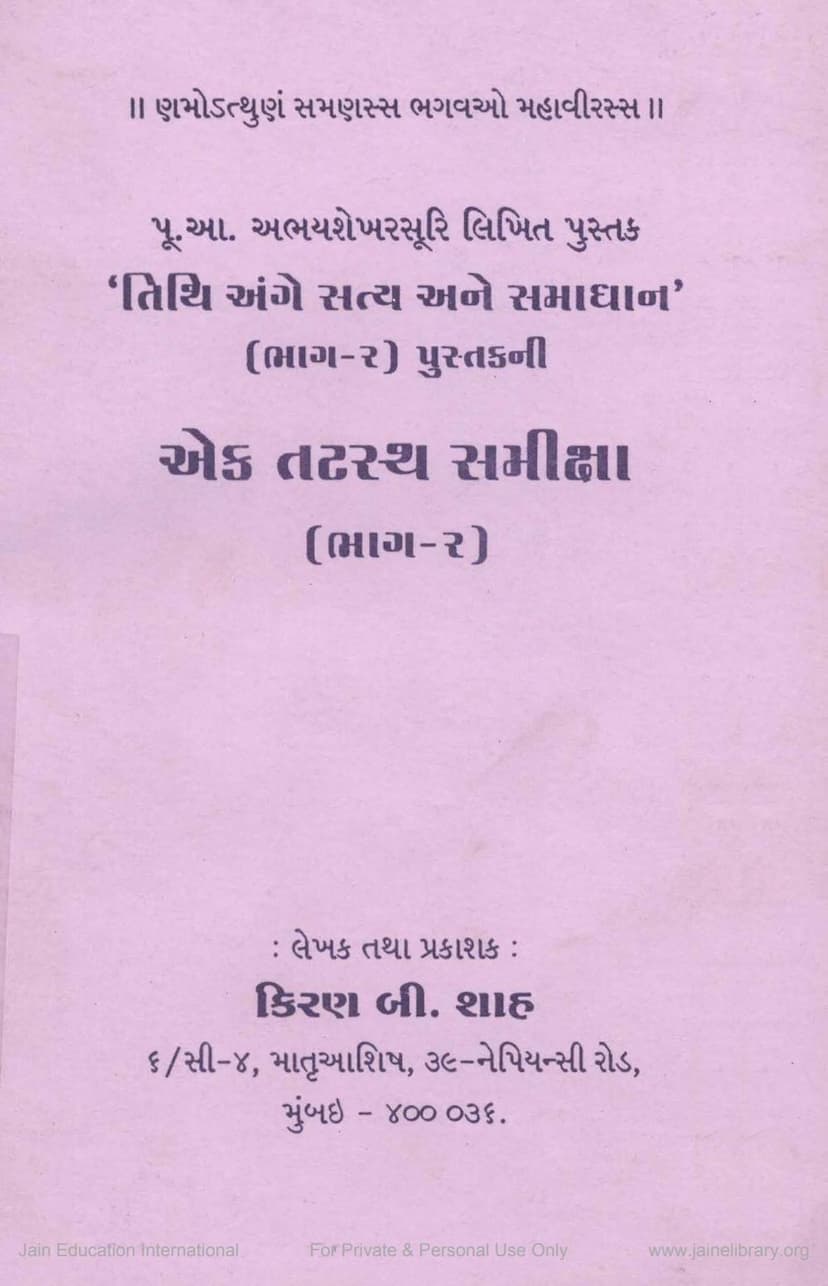Ek Tatastha Samiksha Part 2
Added to library: September 1, 2025

Summary
This document is a critical review of a book titled "Tithi Ange Satya ane Samadhan Bhag 2" (Truth and Resolution Regarding Dates, Part 2) written by Acharya Abhayashekhar Suri. The review is authored by Kiran B. Shah and is titled "Ek Tatastha Samiksha Part 2" (An Impartial Review, Part 2).
The core of the review is a strong disagreement with the interpretations and arguments presented in Acharya Abhayashekhar Suri's book, particularly concerning the correct observance of Jain religious dates and rituals. Kiran B. Shah argues that Acharya Abhayashekhar Suri's book promotes "scripture-independent unity" which he contends is mere sophistry and leads to the distortion of Jain scriptures.
Key arguments and themes presented by Kiran B. Shah include:
- Reliance on Scriptures (Shastra Mati): Shah repeatedly emphasizes the paramount importance of adhering to the scriptural principles (Shastra Mati) as the ultimate authority in Jainism. He criticizes Acharya Abhayashekhar Suri for deviating from these principles, allegedly for the sake of unity.
- Critique of "Unity for Unity's Sake": Shah labels the pursuit of unity without scriptural backing as a dangerous trend that leads to the misinterpretation of scriptures, the belittling of revered gurus, and the promotion of illogic.
- Historical Disagreements and Court Cases: The review references past disputes, including a specific "Matunga Case," where according to Shah, the "one-date faction" suffered multiple court defeats due to following improper guidance. This is used to illustrate the consequence of ignoring scriptural principles.
- Rejection of "Self-Opinion" (Swa Mati): Shah highlights the emphasis on "Swa Mati" (self-opinion) by Acharya Abhayashekhar Suri, contrasting it with the scripturally-derived opinions of revered gurus and scholars.
- Specific Doctrinal Disputes: The review delves into specific issues, including the correct observance of Samanvatsari (a major Jain festival) and the interpretation of scriptural passages related to Kshaya (decay/reduction) and Vruddhi (increase) of lunar dates (Tithi).
- Debunking Acharya Abhayashekhar Suri's Arguments: Shah systematically refutes specific claims made by Acharya Abhayashekhar Suri, often by quoting other scriptures or the writings of revered gurus, including Acharya Abhayashekhar Suri's own predecessors.
- Allegations of Misrepresentation and Dishonesty: Shah accuses Acharya Abhayashekhar Suri of deliberately omitting crucial parts of texts, misinterpreting scriptures, and even fabricating arguments to support his own viewpoint.
- Challenge to Prove Claims: Throughout the review, Shah repeatedly challenges Acharya Abhayashekhar Suri to provide solid scriptural evidence for his claims, otherwise, he suggests, Acharya Abhayashekhar Suri should retract his statements (perform Michhami Dukkadam).
- Emphasis on the Importance of Gurus: Shah defends the opinions and practices of revered gurus like Acharya Atmaramji, Acharya Danasurishwarji, Acharya Premsurishwarji, and Acharya Siddhisurishwarji (Bapji Maharaj), portraying Acharya Abhayashekhar Suri as disrespecting and contradicting them.
- Call for Adherence to Tradition: The review urges readers to remain faithful to the ancient traditions and the teachings of the scriptures, emphasizing that true unity lies in scriptural adherence.
In essence, Kiran B. Shah presents "Ek Tatastha Samiksha Part 2" as a vigorous defense of the traditional Jain scriptural interpretations concerning the calculation and observance of religious dates. He aims to expose what he perceives as misrepresentations and deviations from established doctrine in Acharya Abhayashekhar Suri's work, urging the Jain community to prioritize scriptural authority over the pursuit of perceived unity without proper scriptural basis.